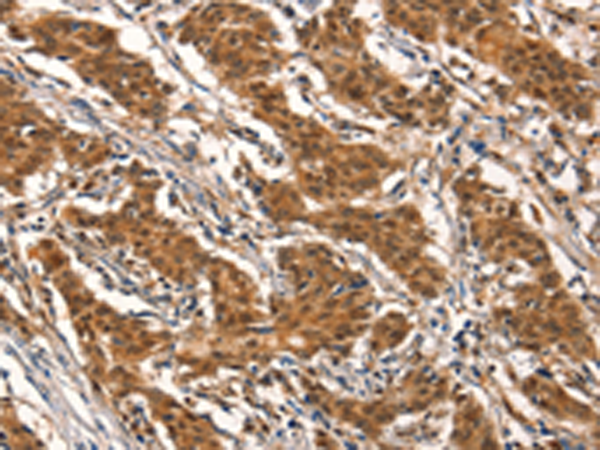

| WB | 咨询技术 | Human,Mouse,Rat |
| IF | 咨询技术 | Human,Mouse,Rat |
| IHC | 1/50-1/100 | Human,Mouse,Rat |
| ICC | 技术咨询 | Human,Mouse,Rat |
| FCM | 咨询技术 | Human,Mouse,Rat |
| Elisa | 咨询技术 | Human,Mouse,Rat |
| Aliases | CPB6; EFVM; IIB1; P450; CYP2B; CYP2B7; CYP2B7P; CYPIIB6 |
| WB Predicted band size | 56 kDa |
| Host/Isotype | Rabbit IgG |
| Antibody Type | Primary antibody |
| Storage | Store at 4°C short term. Aliquot and store at -20°C long term. Avoid freeze/thaw cycles. |
| Species Reactivity | Human |
| Immunogen | Synthetic peptide of human CYP2B6 |
| Formulation | Purified antibody in PBS with 0.05% sodium azide and 50% glycerol. |
+ +
以下是3-4条关于MGMT抗体的参考文献及其摘要概述:
---
1. **文献名称**:*MGMT: Its role in cancer aetiology and cancer therapeutics*
**作者**:Esteller, M.
**摘要**:该综述讨论了MGMT蛋白在DNA修复中的功能及其启动子甲基化导致基因沉默的机制。重点分析了MGMT甲基化状态与肿瘤(如胶质母细胞瘤)对烷化剂(如替莫唑胺)化疗敏感性的关联,强调其作为生物标志物的潜力。
2. **文献名称**:*MGMT gene silencing and benefit from temozolomide in glioblastoma*
**作者**:Hegi, M.E. et al.
**摘要**:通过临床研究发现,MGMT启动子甲基化的胶质母细胞瘤患者对替莫唑胺化疗反应更佳,生存期显著延长。研究支持MGMT甲基化检测在个性化治疗中的应用。
3. **文献名称**:*Assessment of MGMT promoter methylation in glioblastoma: A comparison of methylation-specific PCR and immunohistochemistry*
**作者**:Preusser, M. et al.
**摘要**:比较了甲基化特异性PCR(MSP)与免疫组化(IHC)检测MGMT状态的一致性。研究发现,IHC检测蛋白表达与甲基化状态不完全匹配,推荐结合分子检测以提高准确性。
4. **文献名称**:*Molecular predictors of progression-free and overall survival in patients with newly diagnosed glioblastoma: A prospective translational study*
**作者**:Weller, M. et al.
**摘要**:前瞻性研究证实,MGMT启动子甲基化是胶质母细胞瘤患者无进展生存期和总生存期的独立预后因素,并建议将其纳入临床治疗决策框架。
---
这些文献覆盖了MGMT的分子机制、检测方法及其在癌症治疗中的临床应用,可为相关研究提供参考。
**Background of MGMT Antibody**
The O⁶-methylguanine-DNA methyltransferase (MGMT) protein is a DNA repair enzyme that plays a critical role in maintaining genomic stability. It functions by removing alkylation adducts, specifically at the O⁶ position of guanine, which are induced by chemotherapeutic alkylating agents like temozolomide (TMZ) or environmental carcinogens. High MGMT expression in tumor cells is associated with resistance to such therapies, as the enzyme rapidly repairs DNA damage, counteracting the cytotoxic effects of treatment.
In clinical oncology, MGMT has gained prominence as a predictive biomarker, particularly in glioblastoma (GBM). The methylation status of the MGMT gene promoter is a key determinant of its expression. Hypermethylation silences the gene, reducing MGMT protein levels and thereby enhancing tumor sensitivity to alkylating agents. Patients with MGMT promoter-methylated GBM often exhibit better responses to TMZ and improved survival outcomes.
MGMT antibodies are widely used in immunohistochemistry (IHC) to assess protein expression in tumor tissues, aiding in therapeutic decision-making. However, discrepancies between MGMT protein _expression (detected by IHC) and promoter methylation status (assessed via PCR-based methods) have prompted recommendations to combine both approaches for robust biomarker evaluation. Research continues to refine antibody specificity and explore MGMT's role in other cancers, underscoring its dual significance as a repair enzyme and a therapeutic target.
×